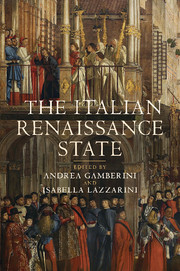Introduction
Published online by Cambridge University Press: 05 August 2012
Summary
Renaissance Italy and its political cultures are a fundamental but controversial topic of Western historiography on the late medieval and early modern state: the political, economic and cultural innovations introduced both by civic humanism and by Renaissance political thought from Marsilio da Padova to Machiavelli, the merchants’ and bankers’ networks and empirical culture, the rather mythicised artistic, literary and cultural achievements, from Giotto to Michelangelo, from Petrarch to Ariosto, have been considered ever since as some of the most significant steps towards ‘modernity’. On the other hand, the concrete political weakness of the Italian peninsula pulled it out of the mainstream leading towards the so-called modern state, leaving to the Italian republics, principalities and political actors only a marginal role in the evolution of the modern European political identity in the crucial period between the sixteenth and the eighteenth centuries. Thus, the Renaissance and Italy, achievements and failures, are deeply linked in a double knot whose components did not precisely overlap and whose combination still provides room for investigation to the community of political, social and cultural historians of Western civilisation.
The Italian Renaissance State: two reasons for a title
Deeply conscious of this apparent paradox, we have devised the present volume to meet two main aims. The first is to provide a synthesis of current Italian research on the political history of Italy, taking into account both a general survey of the transformation and features of Italian kingdoms, principalities, feudal and ecclesiastical signorie and republics from the fourteenth to the early sixteenth centuries, and a wide range of key themes that were common to the political experience of all these states.
- Type
- Chapter
- Information
- The Italian Renaissance State , pp. 1 - 6Publisher: Cambridge University PressPrint publication year: 2012
References
- 1
- Cited by



